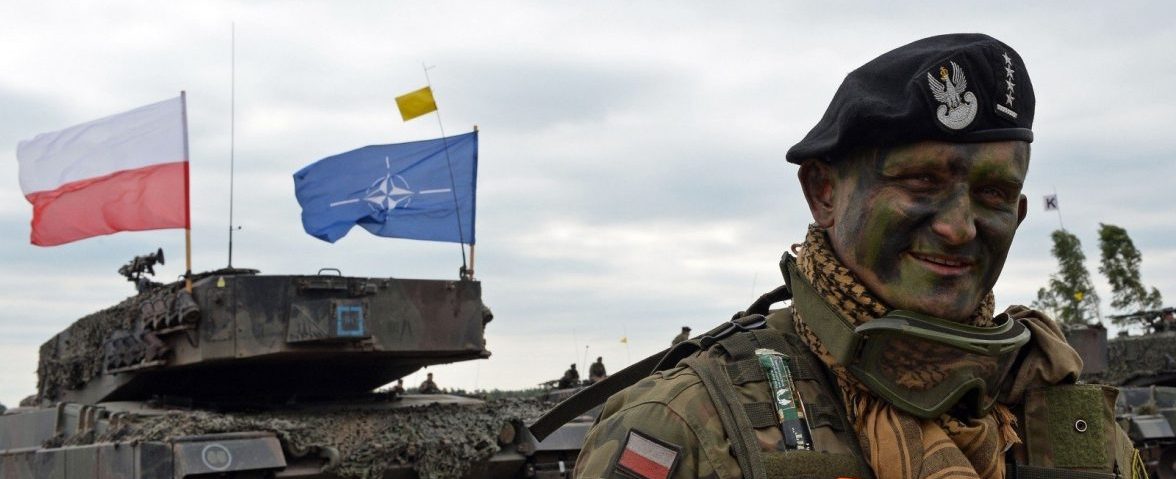On the eve of the NATO summit, to be held in Brussels in July, the Polish Ministry of Defense issued an interesting report, titled “Proposal for a U.S. Permanent Presence in Poland”. Apart from European and NATO diplomats who are going to meet in Brussels, Warsaw expects to influence the opinions of US Congressmen and Pentagon analysts. Considering that the Congressmen will vote soon for the US military budget, the Poles want their arguments to be well heard.
Briefly speaking, the document proposes to host a significant American contingent in Poland on a permanent basis. It is noteworthy that Warsaw does not attach any conditions for the US to comply with, quite the opposite: it takes the initiative to sponsor this deployment to the tune of 1.5 to 2 billion dollars.
On the one hand, the move will inevitably lead to a new crisis in Russia-NATO relations, aggravating suspicion and fears on both sides. On the other hand, the situation appears to be almost comic: the Poles literally understood Trump’s statement that NATO is not a strategic alliance aimed at fighting life-threatening dangers, but a franchising network, which requires paying first a fee to join and then regular royalties to stay.
It is interesting, however, that Warsaw is appealing directly to the US, not to NATO and the EU as organizations. The European bureaucracy, whose opinion was thus disregarded, will hardly approve this Polish initiative. Thus, Poland is deepening the crisis of multilateral trans-Atlantic institutions, NATO and the EU, where consensus is the fundamental principle.
In addition, the Polish initiative highlights a peculiar format of relations between NATO allies. In this format it is not the US trying to impose its will on minor allies in the interests of its global strategy (that is how its actions are usually interpreted in Russia). It is quite the opposite: it is the minor US allies trying to “drag” Washington in by any means, forcing it to strengthen its security guarantees.
One could only thank Warsaw for such sincerity. This line, previously implemented by the political establishment of such countries as Georgia and Ukraine, has now been adopted by America’s NATO ally in Europe, Poland. In case of Georgia, the situation was almost absurd: there was a period when American financial aid allocated to the country was used to pay for the services of Washington lobbyists supposed to convince the American legislators to provide Georgia with the NATO Membership Plan of Action. In other words, American lobbyists tried to provide Georgia with new guarantees and resources with US taxpayers’ money.
Poles, who know much better than Georgians and Ukrainians how the US foreign policy works, designed their proposal in a figurative language understandable to the US legislators, having done that in advance. The NATO summit will be held in six weeks, and the discussion on the next year’s military budget is already underway in Washington. The proposal draws on the materials of the American foreign policy debate: the text quotes authoritative American diplomats, military and analysts. US Congressmen can recognize the presented arguments, even if they are far from being complete. The thing is that even the most acute recommendations of American analysts include warnings: regardless of how we act, we should not provoke Russia to retaliate.
Even if the Polish proposals elicit response, these initiatives are unlikely to be realized in the current context. However, let us assume that Americans are tempted by the amount of money proposed, and the European franchising will get another American military base. In my point of view, it will result in devaluation of the US security guarantees, previously given to America’s allies. The report attempts to calculate cost-effectiveness of the US military presence in Poland. But its authors believe that such presence will not provoke a conflict, and Moscow will consider it as a means of deterrence. Unfortunately, our intentions and their perceptions often diverge. What Warsaw has been trying to prevent can become reality as a result of its initiatives . What if Russia considers the US armored divisions in Poland to be an army of invasion? Will the US base still be cost-effective, if its deployment provokes a conflict in the region?
Poland’s behavior may trigger another question: what is the role of small and medium-sized countries in the great powers’ strategic competition of the 21st century? Let’s look at two neighboring countries – Poland and Belarus – as an example. The Polish case is about striving for maximum security, which is in fact being minimized, resulting in mistrust and escalation, increasing the chances of an accidental crisis. Belarus seems to be maintaining more constructive and conscious position, standing on the platform of non-bloc “security for all”, by establishing a steady dialogue between all the parties involved.
I think that there are no structural conditions for a large-scale war in Europe. The European system, as it is today, has successfully passed the stress tests presented by the Ukrainian crisis and the Russia-Turkey crisis of 2015. Many people tend to compare today’s situation with the circumstances preceding the World War I. However, let us recall: at first it was welcomed in Europe, the public even committed to it, seeing it as a solution to the endless contradictions. Now not a single country in the continent believes that war can be the solution for the issues accumulated over the past years.
Conversely, both the Ukrainian and the Turkish crises show that the parties are seeking to prevent confrontation from growing into a Europe-wide crisis. Yet, it does not reduce the likelihood of an inadvertent crisis, which may be caused by errors of perception. Unfortunately, this is what the Polish initiative can lead to. Poland’s moves are only aggravating the situation in the sphere of European security, not the opposite.
First published at valdaiclub.com












